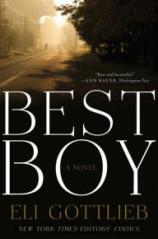Best Boy
Review
Best Boy
Told from the perspective of Todd Aaron, an autistic and developmentally challenged man in his 50s, BEST BOY is a poignant, perceptive book about a deeply sensitive individual and the way he sees the world around him. Although Todd has lived a relatively happy life, certain changes propel his emotional growth into new realms, forcing him to take a closer look at the people closest to him.
When we first meet Todd, he is residing in Payton LivingCenter, a home for both developmentally challenged and brain-injured adults at varying levels of functionality. Todd has lived at Payton since he was 13, when his mother dropped him off at the home, promising that he would be happy and safe, so long as he was a “Best Boy.” For Todd this means behaving, controlling his violent mood swings and taking his medication. Ever the adoring son, Todd has remained a Best Boy for over 40 years, making him one of the oldest residents of Payton. Now his parents are deceased, and his only source of familial contact comes through frequent phone calls and semi-regular visits from his brother, Nate. Although he does not like his roommate, the obnoxious Tommy Doon, he is fortunate to have Raykene, a devoted staff member who calms and nurtures him.
"To spoil the ending of such a poignant work would be a disservice not only to Gottlieb, but also to the childlike, astoundingly insightful character of Todd Aaron.... In telling his story, Gottlieb illuminates the world of adult autism, showing readers that everyone deserves to live a fulfilling life full of love and hope."
For the most part, Todd lives a quiet, stable life --- though it was not always that way. Through brief yet vivid flashbacks, author Eli Gottlieb shows the reader that Todd was often abused by his father, who did not understand his son’s disorders with the same clarity we have today. Instead, he believed Todd to be stupid and selfish, often blaming him for even minor accidents. Contrasted so starkly to the past, Todd’s everyday life seems even more tranquil. In a very short period, Gottlieb has managed to relay a man’s entire history, from terror to peace. At the same time, he provides a history of autism itself, from its misunderstood beginnings to its status as a well-known spectrum disorder.
All of that, however, changes when Payton hires a new staff member named Mike Hinton. Though he is smelly and a bit loud, Mike is mostly affable, even earning the respect of Raykene as soon as he arrives on campus. Despite Raykene’s word, Todd cannot see past Mike’s eyes, which hold the same darkness as his father’s once held. Terrified, Todd causes a scene, quickly singling himself out for Mike’s attention. As Mike attempts to befriend him through casual conversation and special responsibilities, it becomes clear that something is amiss --- something that deeply sensitive Todd can see while others cannot. Still, Todd cannot pick up on social cues such as sarcasm or obvious lies, and thus his suspicion remains ungrounded, even as the reader is slowly building a case against Mike. Gottlieb’s careful handling of Todd’s condition heightens the drama here, while preserving his protagonist’s sweet naivety.
At the same time, a new girl named Martine has arrived at Payton. Tall, fiery and missing one eye, she immediately captivates Todd. When the two begin a friendship, she confides in him that she is going to stop taking her medication and urges him to do the same. Torn between his desire to be a Best Boy and his curiosity about Martine, Todd makes the difficult decision to follow in her lead. But as Mike’s behavior becomes increasingly erratic, Todd begins to lose the careful grip he once had on his isolated world and grows desperate to return to his childhood home. Over the course of several phone calls and one visit, he begs his brother to allow him to return. Although Nate seems decent, the reader can sense that he is hiding something. Plagued by old memories and current obsessions, Todd misses these clues, prompting the reader to pay even closer attention to Nate’s words and actions. Once again, Gottlieb’s precise pacing and perceptive characterization take his narrative to a new level, making the reader suspicious, worried and hopeful all at once.
Now grappling with a new love interest, a devious foe and a dysfunctional family, Todd’s desire to return home takes on a desperate, dangerous new urgency. Invigorated, he begins to plan an escape, certain that everything will be fine as long as he can return to the place his mother once lived. But, as the reader knows all too well, childhood homes are never the same when we return to them.
To spoil the ending of such a poignant work would be a disservice not only to Gottlieb, but also to the childlike, astoundingly insightful character of Todd Aaron. Though he often misses the minute details of what is occurring around him, his judgments of character are never far off, indicating a deep intelligence. In telling his story, Gottlieb illuminates the world of adult autism, showing readers that everyone deserves to live a fulfilling life full of love and hope.
Reviewed by Rebecca Munro on August 28, 2015
Best Boy
- Publication Date: May 24, 2016
- Genres: Fiction
- Paperback: 272 pages
- Publisher: Liveright
- ISBN-10: 163149192X
- ISBN-13: 9781631491924





